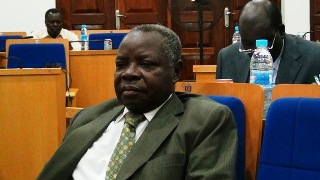South Sudan vows to continue austerity measures after oil flows
May 24, 2013 (JUBA) – South Sudan’s finance ministry said on Friday that the administration will continue to impose austerity measures even if the country generates enough funds to support the budget from the resumption of oil production.

A former journalist turned politician, who became a leading member of the ruling Sudan People’s Liberation Movement (SPLM) during the 1980s at the height of the decades-long north-South conflict, Manibe said steering the country’s economy in the right direction was no easy task.
“Putting the economy in the right [direction] anywhere [the] world over is never easy; It is always painful and our people should understand the situation in which we are. They should be the ones to come with suggestions to reform the economy instead of being resistant”, Manibe told reporters on Friday.
The South struck a deal with Khartoum in April, allowing for the resumption of oil production.
However, Manibe said stringent checks on government wages and other spending will remain in place in order to improve the country’s financial security in the longer term.
Following its split with neighbouring Sudan in July 2011, South Sudan took with it the bulk of the former united country’s oil wealth, but still needs to use Sudanese infrastructure to pump its oil north to export markets.
Last January, South Sudan took the dramatic step of shutting down its oil production – accounting for 98 per cent of government revenues – after failing to resolve a dispute with Khartoum over transit fees.
Under harsh new measures introduced by the government last February following the shutdown, non-salary spending was slashed by 50% and unconditional grants to state governments were eliminated. Civil servants also faced job cuts, while their incentive schemes were frozen and housing allowances trimmed by 50%.
Aid agencies warned at the time that the government’s tough austerity measures could have serious implications on the humanitarian situation in South Sudan, where many people already live below the poverty line.
(ST)
